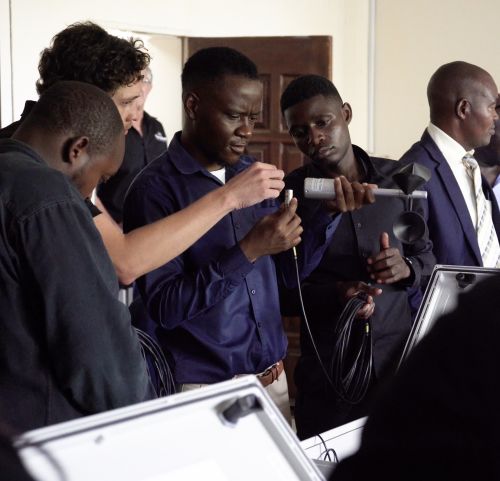How Do You Put Learning into Action?
par Vim Mistry | Mis à jour le : 03/11/2024 | Commentaires : 0

While continuous learning in the field of environmental monitoring is important, it’s even more critical to put that learning to practical use. Understanding the benefits for both employees and organisations to stay up to date on technology, expand expertise, and improve performance is one thing. But what does this look like in real-world applications?
If you haven’t read this previous blog article (4 Reasons Why Continuous Learning Is Critical for Environmental Monitoring), I encourage you to do so before reading this one. In this blog article, we'll take a closer look at how Campbell Scientific training made a tangible difference in strengthening climate resilience in Zambia. This project involved installing 120 automatic weather stations across the country, a challenging task due to the rugged terrain and difficult road conditions.
The Power of Training
To ensure this project’s success, Campbell Scientific provided comprehensive training for both technicians and weather-data users. This training covered a wide range of topics, including:
- Automatic weather station (AWS) installation and maintenance
- Data collection and quality control
- Data analysis and interpretation
- Forecasting and decision-making using weather data
The impact of this training extends far beyond technical skills. Training can equip technicians with the skills and confidence to install and maintain weather stations in even the most challenging environments. More importantly, it can empower a team to understand and use the data effectively, leading to tangible improvements in weather forecasting, agricultural practices, and disaster risk reduction.
Project Impact
The Zambia project has had a significant impact on the country's climate resilience. The new weather stations provide real-time data that is used to:
- Improve weather forecasts and warnings
- Monitor climate trends
- Develop climate-smart agricultural practices
- Manage water resources more effectively
- Reduce the risks of disasters such as floods and droughts
These improvements have led to several benefits for the people of Zambia, including:
- Increased food security
- Improved water availability
- Reduced economic losses from disasters
- Enhanced livelihoods
Conclusion
The story of Zambia's climate resilience journey isn't just about numbers—it's about empowered individuals, thriving communities, and a nation equipped to face the challenges of a changing climate. The project is a clear example of how Campbell Scientific training can make a real difference in the world. By providing comprehensive training to technicians and weather-data users, Campbell Scientific helped to ensure this important project’s success. The training played a pivotal role in this transformation, demonstrating the tangible impact of continuous learning.
Are you ready to empower your team?
Are you facing environmental monitoring challenges or seeking to unlock your data’s full potential? Let Campbell Scientific’s training be your guide. Our comprehensive programs, tailored to your specific needs, can equip your team with the expertise to make a real difference, just like they did in Zambia.
Visit our Customer Training page today and embark on your own journey of transformation!
Credits: Ramatoulaye Nabi and Sibusiso Boyi of Campbell Scientific contributed to this article.




 Vim Mistry is a Senior Technical Support Engineer and Training Lead at Campbell Scientific Limited in the United Kingdom. His areas of expertise are diverse: technical support, sales, project management, and training. Whether in person or virtually, Vim shares his knowledge and expertise with others, helping them navigate technical issues and optimize their use of Campbell Scientific products. He has a masters degree from the University of Loughborough (UK) in Electronic and Electrical Engineering with a diploma in industrial studies.
Vim Mistry is a Senior Technical Support Engineer and Training Lead at Campbell Scientific Limited in the United Kingdom. His areas of expertise are diverse: technical support, sales, project management, and training. Whether in person or virtually, Vim shares his knowledge and expertise with others, helping them navigate technical issues and optimize their use of Campbell Scientific products. He has a masters degree from the University of Loughborough (UK) in Electronic and Electrical Engineering with a diploma in industrial studies.
Commentaires
Please log in or register to comment.